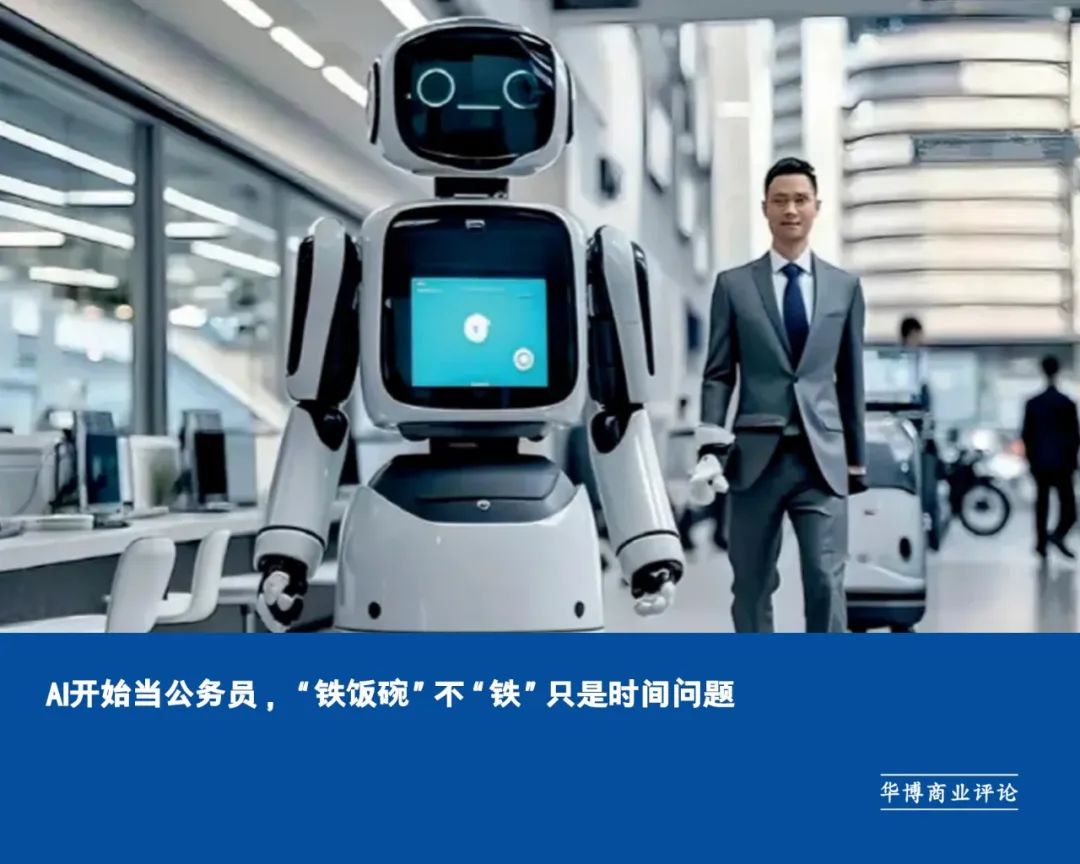AI Assumes Roles of Civil Servants: The End of the 'Iron Rice Bowl' Era Nears
![]() 03/18 2025
03/18 2025
![]() 644
644

Produced by|Huabo Business Review
On February 15, the official WeChat account of 'Xingfu Futian' reported that Futian District in Shenzhen had recently launched AI digital employees powered by DeepSeek technology. Concurrently, the Futian District government service large model version 2.0 was officially unveiled. According to a March 13 report by China News Weekly, all 31 provinces, autonomous regions, and municipalities directly under the central government in China have invested in the 'AI + government affairs' initiative. In less than a month, AI has transitioned from initial trials to widespread adoption, rapidly competing with humans for their traditional 'iron rice bowls'.
The Decline of the 'Iron Rice Bowl' is Inevitable
In today's world, bloated and inefficient government agencies are a persistent problem across various nations. The rapid advancement of artificial intelligence offers new solutions to this issue. As early as 2019, Southern Weekend published an article titled 'AI is Impacting the 'Iron Rice Bowl' of Civil Servants,' citing Indonesian President Joko Widodo's decision to eliminate two levels of civil servants in 2020 and replace them with AI to streamline administrative procedures and reduce bureaucratic hurdles. Additionally, the article mentioned that Tokyo's Minato Ward introduced AI technology into the admission review of childcare facilities in fall 2019. China's government work report this year also sent a significant signal, clearly proposing for the first time to 'strictly control the scale of financially supported personnel,' encompassing not only all personnel relying on financial funds but also civil servants and career personnel in a narrower sense. While the exact number of financially supported personnel in China remains undisclosed, the appeal of the 'iron rice bowl' is undeniably growing. Offcn Education statistics reveal that the total number of applicants for the 2025 national civil service examination reached 3.258 million, a year-on-year increase of over 340,000, setting a new record. It's crucial to clarify that strictly controlling the scale does not entail crude cuts to the 'iron rice bowl'; rather, it's a comprehensive and gradual process. In fact, China's civil servant recruitment numbers continued to rise steadily in 2025. Data cited by China Youth Daily from relevant institutions shows that more than 20 provinces recruited a total of 165,241 civil servants in 2015, an 8.4% increase from the previous year. However, the government's urgent need for 'cost reduction and efficiency improvement' cannot be overlooked. China Business News data indicates that China's broad fiscal revenue in 2024 was approximately 28.2 trillion yuan, a 1.9% year-on-year decrease, while broad fiscal expenditure reached 38.6 trillion yuan, a 2.7% increase. The gap of approximately 10 trillion yuan is primarily bridged through bond issuance.
Anticipating the 'Catfish Effect' Sparked by 'AI Civil Servants'
Despite being in the early stages of technological development, 'AI civil servants' have already demonstrated numerous advantages over traditional human labor. They are immune to emotional fluctuations and fatigue-induced errors. Crucially, 'AI civil servants' do not occupy staffing quotas, and their training to official induction is swift and efficient, significantly reducing human and administrative costs. For instance, the 70 'AI civil servants' in Futian District, Shenzhen, have shown remarkable efficiency and accuracy. In document processing, they achieve a format correction accuracy rate exceeding 95%, with a 90% reduction in review time and an error rate strictly controlled within 5%. The 'Law Enforcement Document Generation Assistant' is particularly potent, swiftly converting law enforcement records into initial document drafts. In handling people's livelihood demands, 'AI civil servants' have also achieved notable results, increasing the accuracy rate of demand allocation from 70% to 95%. The 'AI Investment Promotion Assistant' has played a vital role, enhancing enterprise analysis and screening efficiency by 30%. These 'AI civil servants' not only possess DeepSeek's general capabilities but also seamlessly integrate with various departments' actual business processes to tailor personalized intelligent agents. The first batch alone can cater to up to 240 business scenarios, providing comprehensive and precise support for government work. However, it's crucial to recognize that government work is complex and diverse, necessitating close public interaction. In practice, factors beyond efficiency and accuracy must be considered. While AI excels in standardized and repetitive tasks, it faces formidable challenges in areas like humanistic care, complex decision-making, and value judgment inherent in government services. Currently, 'AI civil servants' primarily serve as 'intelligent assistants' in government work, assisting humans in judgment and decision-making, and there's still a substantial gap before they can independently tackle complex problems. The emergence of 'AI civil servants' can also generate a positive 'catfish effect,' spurring underperforming or complacent civil servants. To avoid being swept away by the tide of time or replaced by AI, civil servants must learn to collaborate with AI, continually enhance their core skills, and devote more energy to creative tasks such as policy innovation, emergency management, and people's livelihood services future., In human the-machine collaboration will become the norm, and the civil service system will inevitably evolve in this direction.








